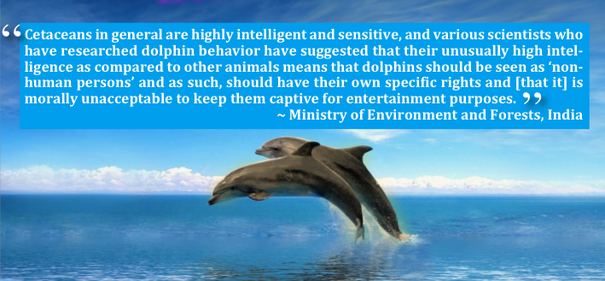Dolphins declared "Non-Human Persons"
by Alanna Ketler
It was a great day for animal rights activists around the world when India’s Ministry of Environment and Forests agreed to ban the use of dolphins and other cetaceans — such as whales and porpoises — for public entertainment, and to forbid them from being held captive anywhere in India. The ban was determined in the wake of attempts to open several parks across the country featuring aquariums with dolphins and whales. Activists began to protest, explaining that dolphins and whales are smarter and more sensitive than previously thought, evidenced by their impressive cognitive abilities. They presented a great deal of scientific research to prove the scope of cetaceans’ intelligence and therefore the inhumanity of keeping them captive. The movement for dolphin and cetacean rights gained significant ground in 2011 when the American Association for the Advancement of Science held a conference that included conservationists, environmentalists, philosophers and animal behaviorists. They then began to gather support for the Declaration of Rights for Cetaceans from the scientific community. The Declaration: 1. Every individual cetacean has the right to life. 2. No cetacean should be held in captivity or servitude; be subject to cruel treatment; or be removed from their natural environment. 3. All cetaceans have the right to freedom of movement and residence within their natural environment. 4. No cetacean is the property of any State, corporation, human group or individual. 5. Cetaceans have the right to the protection of their natural environment. 6. Cetaceans have the right not to be subject to the disruption of their cultures. 7. The rights, freedoms and norms set forth in this Declaration should be protected under international and domestic law. Many experts have long considered dolphins and whales to be highly intelligent. Dolphins have been known to recognize their own reflection in a mirror, give each other distinct names and solve puzzles. They even have their own rich and intricate culture. Of course, the biggest controversy is the idea of creating the new category of “non-human persons.” Do we stop at dolphins and whales? If not, where do we draw the line? If we give rights to some animals, how do we then justify our continued exploitation of others? And since we bestow the status of personhood on such non-living entities as corporations, why shouldn’t all living beings enjoy the same legal rights? Among animal rights supporters, India's move to abolish captivity for dolphins is seen as a big step forward in the right direction. “This is a huge win for dolphins,” says Ric O’Barry of the Earth Island Institute’s Dolphin Project. "Not only has the Indian government spoken out against cruelty, they have contributed to an emerging and vital dialogue about the ways we think about dolphins: as thinking, feeling beings rather than pieces of property to make money off of.” More Information: 
If you like this story, please consider taking out a donation-based subscription to support Positive News.
|
|





